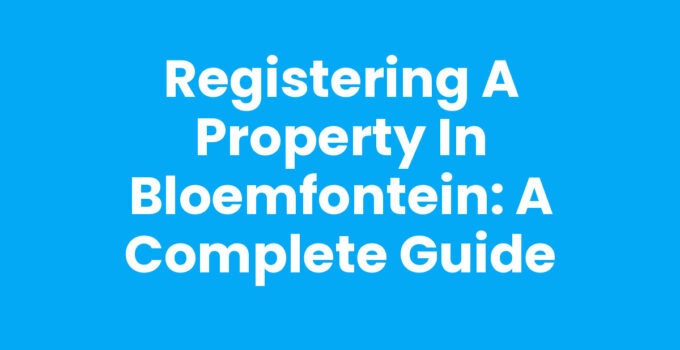Owning property in Bloemfontein can be an exciting venture, whether you’re purchasing your first home or investing in real estate. However, navigating the process of registering a property can be daunting without the right information. This guide aims to simplify the registration process, outlining everything from necessary documentation to legal considerations.
How to Register a Property in Bloemfontein: A Step-by-Step Guide
Registering a property in Bloemfontein involves several important steps, each requiring attention to detail. Below is an ordered outline of steps to follow:
- Conduct a Property Search: Before falling in love with a property, ensure it’s free from any legal complications. Visit the local Deeds Office to check the property’s title deed and any encumbrances.
- Obtain an Offer to Purchase: Once you’re satisfied with the property, sign an Offer to Purchase document with the seller. This contract outlines the purchase conditions and should be reviewed carefully.
- Hire a Conveyancer: A licensed conveyancer will help you process the registration and ensure all legal obligations are met. They will handle documents, liaise with the Deeds Office, and compile necessary information.
- Gather Necessary Documentation: Prepare the required documents, including:
- Copy of the Offer to Purchase
- Identity documents of both the buyer and seller
- Proof of payment (deposit and purchase price)
- Clearance certificates from local authorities
- Any relevant tax clearance documents
- Submit to the Deeds Office: Your conveyancer will lodge the property transfer application at the Deeds Office, along with all compiled documents.
- Pay Registration Fees: Fees for property registration vary, typically based on the property’s value. Ensure to pay through your conveyancer.
- Receive Confirmation: After processing, the Deeds Office will register the property in your name, and you’ll receive a title deed as proof of ownership.
Read Also: Discover Bloemfontein for Families: Fun Activities and Tips
Benefits of Registering a Property
The registration of property is essential for several reasons:
- Legal Protection: Registered properties are recognized by law, offering assurance of ownership and minimizing disputes.
- Financial Security: Property ownership can increase personal wealth and equity, serving as a valuable asset for loans or investments.
- Marketability: A registered property is easier to sell or transfer, presenting a clear title to prospective buyers.
Read Also: Explore Begonia Street, Bloemfontein: A Hidden Gem Awaits
Common Mistakes to Avoid When Registering Property
Even with a clear process, applicants can stumble. Here are some pitfalls to avoid:
- Neglecting Documentation: Incomplete or incorrect paperwork can delay the registration process. Double-check all forms.
- Underestimating Costs: Beyond purchase price, anticipate additional costs like conveyancing fees, taxes, and registration fees.
- Not Consulting Professionals: Attempting to navigate the registration without a conveyancer may lead to errors. It’s worth investing in experienced guidance.
In summary, registering a property in Bloemfontein requires diligence and an understanding of the legal framework in place. From conducting a property search to working with professional conveyancers, having clarity on each step will facilitate a smoother registration process.
Ultimately, this not only assures your legal ownership but also enhances the investment potential of your property. Take these steps and approach the registration process with confidence!
Check This: Discover Saidman, Bloemfontein: Your Ultimate Guide to the Area
Frequently Asked Questions
What documents are required for registering a property?
You need the Offer to Purchase, ID documents, proof of payment, clearance certificates, and tax clearance documents.
How long does the property registration process take?
The process typically takes between 6 to 8 weeks, depending on the Deeds Office workload and accuracy of documentation submitted.
Can I register property without a conveyancer?
While it’s possible, it's highly advisable to hire a conveyancer to ensure compliance with legal requirements and avoid mistakes.



